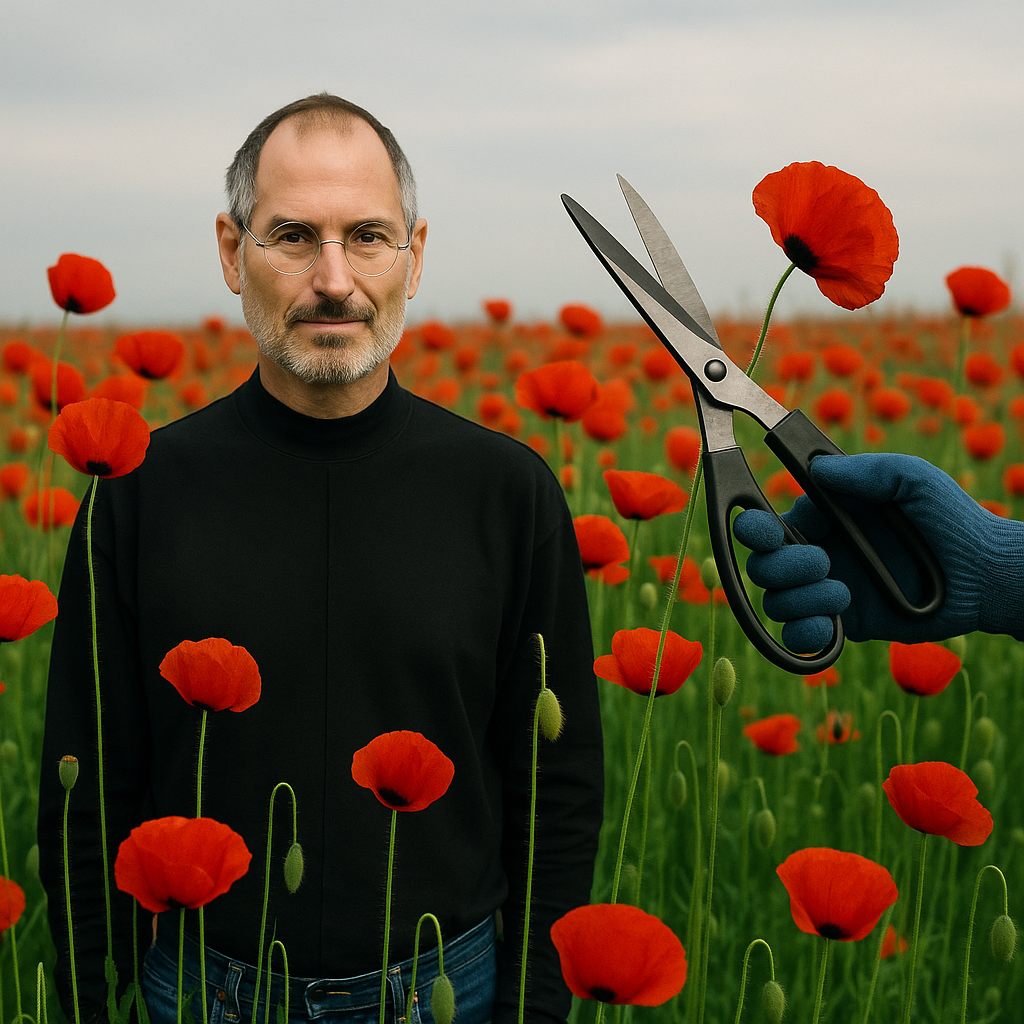EP 42: Real Confidence- The Joy of Cutting Others Down with Special Guest Doug Garland

Knowing it was out of envy that the chief priests had handed Jesus over to him. Mark 15:10
I am sharing a short, 18-minute podcast, that I did on the first of this year before my website was up and running (see https://lnkd.in/eGgpEPXP). It is shorter than most of my guest podcasts but covers the salient TPS information.
Alyssa Dver is the CEO and co-founder of the American Confidence Institute (ACI) which shares science-based ways to sustainably increase personal, academic & professional confidence. She is the composed host of the Real Confidence Podcast.
Here is the printed version with all its grammatical errors if you prefer to read it:
You wouldn’t think so, but that bit of pleasure we experience when we knock someone down a few pegs? It’s a confidence sweet spot.
And it doesn’t matter if we do it in an obvious way or a passive aggressive way, the underlying reason is the same: part of us is envious of the other person’s success and believes if we can bring them down to our level, we’ll feel better about ourselves.
While this behavior can go by any number of names, my guest on this episode of the podcast was introduced to it firsthand when he was working in Australia and it happened to him. Colleagues who saw him as “tall poppy” cut him down in stature as their way of limiting his – and equalizing the group’s – success.
My guest was so fascinated by this, that ultimately, he wrote an entire book about it. Listen as Dr. Doug Garland and I talk about the inspiration for The Tall Poppy Syndrome: The Joy of Cutting Others Down.
Highlights from our conversation include:
- The two kinds of envy we experience when see someone we think has more, is more or is better than we do or are
- How our obsession in the US with celebrities and cancel culture is a macro expression of what happens in our every day lives at home and at work
- The paradox of “bigger, better, faster, more” US culture that encourages us to be Tall Poppies and rewards us for cutting them down
- Why it’s not the end of the world if you’ve been “tall poppied”
- The role tall poppies play in the world and why, even if someone might try to cut you down, you still want to grow and flourish
Douglas Garland, M.D. and author of The Tall Poppy Syndrome: The Joy of Cutting Others Down, practiced orthopedic surgery for 37 years in Southern California. In addition to serving as Medical Director of their total joint service at his local hospital for five years, he served as chief of four service units including spinal cord injury and traumatic brain injury. Doug was also a Clinical Professor of Orthopedics at the University of Southern California. You can learn more about Doug and his book at douggarland.com.
Episode Transcript
Ep 42: The Joy of Cutting Others Down
If you're smart and work hard, but just aren't where or who you want to be welcome to your podcast, Real Confidence. I'm your host, Alyssa Dver, and I'll be sharing a bit of brain science, some surprising social secrets, and a touch of tough love. Why? Because I believe confidence is everyone's fundamental right and choice. So, let's get to it.
Alyssa Dver:
So, we're gonna do a really interesting conversation today. Whatever you're doing, you're driving, you're walking, you're sitting at your desk, I'm going to invite you to be really intentional enlisting today, because I've got a extraordinary guest on our podcast. Doug Garland is joining me he is a now retired academic orthopedic surgeon, but he is going to talk to us not about that, he's going to talk to us about something that he wrote is wonderful book called The Tall Poppy Syndrome, The Joy of Cutting Others Down. It's certainly a confidence sweet spot. So, Doug, thank you for joining me and having this conversation today.
Doug Garland:
It's my pleasure.
Alyssa Dver:
So, we need to start with what is tall poppy. And if you can explain it to me, and even the people out there who have never heard about it, I would be grateful.
Doug Garland:
That tall poppy is a metaphor, it's for seeing a field of puppies and seeing one or a few taller than the rest and want to cut that poppy down. So that all are equal. It's a very natural, emotional thing to do, we just can't help ourselves. So, in America, this syndrome is not well known. So that's why I wrote the book.
Alyssa Dver:
Alright, so let's dig a little bit into that, because you set a lot in a very short way, and I appreciate that. But when you say cutting other people down like emotionally, verbally, or what does that really mean?
Doug Garland:
Well, it is active and passive. So, let's, let's use your neighbors. So, there's a lot of so called neighborhood envy. So, you have a nice block. And then you have someone growing tall, he's he is that family is nice yard, nice cars are a little better than the neighborhood. So, the active part of that would be maybe as a really nice sports car, and you key it. So, you're actually using envy for this. It's a comparative emotion. And these two components, good envy and bad and being good envy would be trying to emulate that family, whatever that means. That mean, if you want to work harder, and have more money and buy a better car, but that's in emulation. But the true definition of in envy is coveting what others have, and actually wanting to destroy their happiness. So, the bad envy is that wanting to destroy them. So, the indirect cause would be disparaging remarks about that person to the neighborhood. And, you know, it's, it's inherently hard to be really good. And it's inherently easy to be evil. So, we have a tendency to drip towards the negative, and try and cut that person down.
Alyssa Dver:
Yeah, you know, we've done a lot of topics on bullying, and toxicity, and even on envy, as a signal to tell you that there's something there that you actually really want and to use it productively. So, I'm curious, you know, you said it's not as prevalent in the US. Do we see a very big difference culturally?
Doug Garland:
Well, the original premise of when I did, when I actually felt I was tall poppied. An Australian person told me I was tall poppy. And it's prevalent in the Australian society, Australia, was a penal colony for England. And that culture has remained in that society. So, they like everybody equal there. And tall poppies is part of their culture. I, after I was told that then I searched America and I thought, well, maybe it's our individualism. Why don't we know about the tall poppy here, and we worshipped the individual. So, my original premise of the book I set the book up is a study and the original premises was that that individualism prevented the tall poppy syndrome. 10 years later when the book was written, I mean, it’s all happening in 10 years’ time I'm learning more and more, I actually felt the tall poppy syndrome was in America more than any other country. And it's in all countries, I thought ours was protected by our individualism. But it was, I feel it's actually the meritocracy of our society and the growing tall and crawling the ladder of success. And we have competition and when we have competition, then there's going to be somebody who loses. And frequently, if it's a negative emotion that drove it anger, for example, but mostly, it's envy, then you're gonna have the tall poppy syndrome.
So don't forget that there are more tall poppies in America than any other country. So, we have the opportunity to have more cutting. So, both reasons I feel it's more prevalent in America than any other country. And it was originally described as a government issue, the original description of the tall poppy syndrome was a kingdom and the king. His son went to the next town to rule it, he couldn't do it. So, he sent a messenger back to his father how to rule is father went out into a field of poppies and locked him off, that was described by living, and that became the tall poppy syndrome. But it was really then government's cutting down the opposing leaders. And I actually felt our government is one of the better government governments in the world. But I felt our government was also cutting people down and they use the various departments, whether it's the Justice Department, the IRS, or Federal Trade Commission, but we have, we have a lot of departments in our government that cut people down. So, the tradition of the original description, and governments throughout society and our government is gets no pass either.
Alyssa Dver:
Yeah, and you know, without getting too tangential, because I want to stay in the confidence lane always in this pot. But you know that you could actually say that this the fundamental difference between our political parties is ones very tall poppy and the other ones very not right.
Doug Garland:
So yes, yes.
Alyssa Dver:
Interesting, very interesting. And you and I is economic watch, maybe we can riff on that another time. But let's go back to kind of the personal impact. And I know from even our own listeners, they the number one requested topic has been how to deal with gossip and bullies in the office at work, but it seems that what you're saying is a tall poppy applies to all aspects of life, and can happen in any, you know, personal/professional. I'm curious, do we do you think we get rewarded to be a tall poppy cutter? Or is that considered bad?
Doug Garland:
So let me try and get both of that to I to help people understand the concept. I divided it into two groups. One is the peer to peer, and one is the public. And the public is really the where the tall poppy is involved. So that if you have some Hollywood star, such as Will Smith, get cut down by the public after the Academy Award. That's the example of the tall poppy, the true example. But the tall poppy syndrome happens to real people. So it happens in your family, when you're growing up. You get into school, it happens to you, it happens in your neighborhood. And of course, at work, it happens all the time. So, it's what I call peer to peer, and there is not necessarily a tall poppy. And that once again, is driven by envy, especially bad envy.
So, you're in competition, whether you're in your family in your neighborhood, at work. So, the peer to peer is sort of equal people, and somebody's trying to get an advantage and usually they do it negatively. And so that it's that that cutting that occurs us from the bad envy but you're also right it's the competition, but bullying is you know as they're similar. But they are dissimilar as well, but you know, the bully the problem with the bully is that behavior works in the family and in the school and so they continue that behavior into the workplace. The problem is that nobody ever calls them out. There's never self-reflection, and they can help themselves. It's been successful and that's why they continue to build on it. So, part of understanding the tall poppy syndrome is it helps because it is so prevalent, I feel in America that there's emotions involved with the cutter, there's emotions involved with the cuttee and there's also the emotions involved in the bias person watching the whole thing unfold. So, as you understand the syndrome you, you make better judgments, and you can self-improve. I mean, I was tall poppied, I grew tremendously after that happened is I searched my soul for why I was tall poppied.
Alyssa Dver:
What did you give us a little bit more what happened? And what was the sole result?
Doug Garland:
Well, I was an academic orthopedist, as well as running a private practice. And I was head of the American Spinal Injury Association. And I was to go to Australia to for a six week sabbatical to help him with some of their spinal cord injury units. And when I came back from a meeting where we actually setting this up, I had a note on my office, saying that my office had been moved down to a cubby hole. I had the premier office, our unit, that spinal cord injury unit I was running was 100 beds, which is one of the largest in the world. So, it's a premier position. And I've published a lot of scientific material from that. And I was just devastated when I found that note on my office door. And I've been I've been at that hospital for 30 years, and most of the I train there. And in for the most part, it was volunteering time, I had a busy private practice, plus all my research and stuff.
So, I was just dumbfounded at what happened. And fortunately, I went home and told my wife, and she called it moving your cheese. She said, well, they've moved your cheese, you know, you've been there 30 years, and younger people are there, and they want to move up. And so, you're kind of in the way. So, you need to go resign. So, I went back to the office the next day, but it brought in three, two pet big plastic containers and I threw all my research all my slides, my talks, everything just closed it and put my key on the desk and walked out. And I call the people in Australia and told them I wouldn't be coming. That's why I threw everything away, I knew somebody would talk me into coming back. And I told them what happened. They said, well, you've been tall poppied.
So that was my introduction to the tall poppy syndrome. It was really good. My wife and I took Fridays off and we enjoyed LA which is very hard to do on the weekend. And my private practice thrived, I became head of the joint service there and manage good service. So, it turned out to be a huge growing process for me. And plus, then writing the book, but was 10 long years. So just because you get tall poppied doesn't mean that's the end of the world. I have a chapter in the book of the tall poppy syndrome and the Tall Poppy Hall of Fame and every tall poppy that's in that was cut down.
Alyssa Dver:
Thank you for sharing that. And thank you for being so honest about it, because I think there is a clear paradox or maybe it's just the result of the syndrome itself, which is we are encouraged to succeed and be academically business wise, whatever your lane is suit, you know, as good as you can be. Be best. Right?
Doug Garland:
Correct.
Alyssa Dver:
And I think you know, I don't think I know, I know, per se with my own educational lane, as well as all the people I work with and some of the accomplishments, you know, it can really be intimidating to people, right? You know, I'm sure there's a lot of podcasters you talk to you that they're just scared to talk to somebody who's been a surgeon, right? Like it's just that scary to people. Scary in an intimidating way. And I guess my question to wrap up today's conversation, because this week, it's fascinating, and we're gonna put information about your book people can really dig deep is how do you avoid? Or should you avoid being the tall poppy, particularly if you're in the United States? Is that something that we should learn how to do? Or is it just something that we need to be aware of?
Doug Garland:
No, we want to do that. That's part of, I think our cancel culture now the worst thing we can do, I mean, if they have egregious behavior, fine. So egregious behavior, my definition of egregious behavior is too much power, it's hubris, pride, lust and greed. I mean, when I look at the egregious behavior and why people are cut down on it’s for those three, those three main reasons. But remember, we don't advance as a society without tall poppies. So, it's really good to have tall poppies. You’re right. I mean, the mantra in my household was you got to go to college to get ahead. So, it is it's just driven into us. It's in America, it's part of who we are. And, and I'm a true believer in that. And, you know, I grew up in a small farm town. And I had my fortunately I had good envy I didn't understand it at the time, but I always align myself with smarter people because I knew they had better habits than I did. They had something I didn't have. So, I tried to emulate them. That's how I got into medical school. That's how I was very successful in both my private and my academic practice was aligning with good people. So, we need that. That's what monuments are for and, and things to help remind us of and to follow the lead the good leader. So yes, tall poppies are extremely important. The Dutch have a saying that the tall tree captures all the wind. So that's why some people don't want that responsibility. Because when you stick out, there will be people want to cut you down. And that's why the book is important because it helps you understand the emotions of the cutters and the emotions of the cuttee and your own emotional involvement in this, especially if you've been cut down if you've been cut down. It's time for growth and self-improvement.
Alyssa Dver:
Words of wisdom beyond anything that I think any young person is yet to appreciate. But I certainly do. So, I am so grateful for your time here douggarland.com is your website, we will put that in our show notes as well again, as a link to the book. For those of you who are listening. It's the Tall Poppy Syndrome: The Joy of Cutting Others Down. Doug, thank you so much for uncovering this, sharing it with us and being so generous with your own story and time.
Doug Garland:
It's been my pleasure, joy meeting you.
Alyssa Dver:
So, before we completely wrap up, I want to let you know that full transcripts and show notes for this and other episodes can be found on the website, www.AmericanConfidenceInstitute.com/podcast. I also want to remind you once again, that the best way to get confidence for yourself is to give it to others and you can do it so easily just by liking and sharing this episode on your favorite social media channels. You can even give me some confidence fuel by sending in any comments about the topics I've covered, or ones you'd like me to consider for the future. So, for now, this is Alyssa Dver, thank you for helping to bring more confidence to the world.
This podcast was produced by Mindful Media. All rights reserved by elicited here in the American Confidence Institute. Music written and performed by Jeff Weinstein.
Tall Poppy Syndrome Newsletter
Join the newsletter to receive the latest updates in your inbox.



